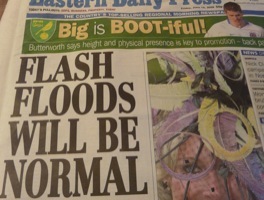Pause: glance at rear-view mirror: engage cliché. Another year comes to an end, but not a decade, despite the convictions of several editors. It works like birthdays: your tenth birthday is at the end if your tenth year, not at the beginning. It really isn’t difficult.
It just sounds wrong. And people like things to sound right. In fact we are so fond of things sounding right that when they do, we stop thinking about them.
Take the slogan “Speed kills”. This sounds so right that newspaper reporters – never people to buck a trend – are more than happy to precede it by the phrase “everybody knows that”. Of course speed kills.
Except that it doesn’t – at least no more than knitting kills, or eating, or water. Speed can be efficient, safe and even exciting. Hitting things at speed can certainly kill, but then a further question has to be asked: why do we hit things?
Unfortunately, however, we’ve stopped thinking now, because speed is so obviously the answer that we are not interested in further questions. And so we never reach the point of considering whether moving at a responsible speed and not dawdling may in fact be the safest way to drive. And constant checking of a speedometer may not be the surest way to avoid danger ahead.
Danger ahead? Brings us nicely to climate change. Here again many people like to think that the earth is warming because it can be made to sound obvious. Pictures of melting ice in various forms; temperature statistics over an appropriate time frame; the guilt factor.
People have other views? They are right-wing, or financed by energy companies, so we don’t have to listen to them. Doctored or hidden data? Pressure on publishers? We’ve stopped listening, because we’ve accepted the scenario. So Copenhagen continued totally unaffected by allegations of data-fixing. Doesn’t fit what we’ve accepted? Ignore it.
In the words of one group, it’s pollution industry lobbyists against youth climate activists. Which says it all really, because pollution is not the issue at all. Carbon dioxide is not dirty. The young activists just like the idea that adults are to blame for screwing up the world, and the details are irrelevant. Can’t blame them really: adults do screw up the world in one way or another. But if children were in charge, they would screw it up worse. They would probably invent something like carbon credits or sub-prime mortgages.
My hope for the New Year is that we might get reconsideration and open discussion about road safety measures and the causes of climate change. These things matter.
Oh, and one more thing. Be careful. Watch out for eating and water, and especially knitting. Pause: glance at rear-view mirror: release cliché.
Rosemary Taylor
On our way through the world, we occasionally come across good people. They lay their lives on the line, sometimes in extreme circumstances, sometimes in very ordinary ones.
Rosemary Taylor was a friend for about 18 years, and during that time she looked after the church hall of St Augustine’s in Norwich. It would not be an exaggeration to say she kept it going over that time, ensuring that the building was in good shape and well presented. She was also the face of the church to the local community.
She was welcoming, encouraging and enthusiastic. Now, after a difficult illness, she has died. It remains to be seen whether someone – or more likely, several people – will step forward to do the many things she did so unobtrusively and well. It won’t be easy.
